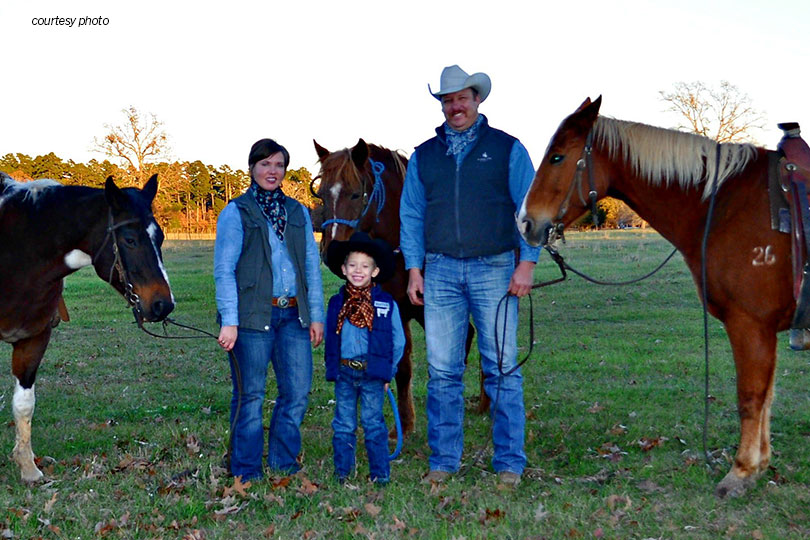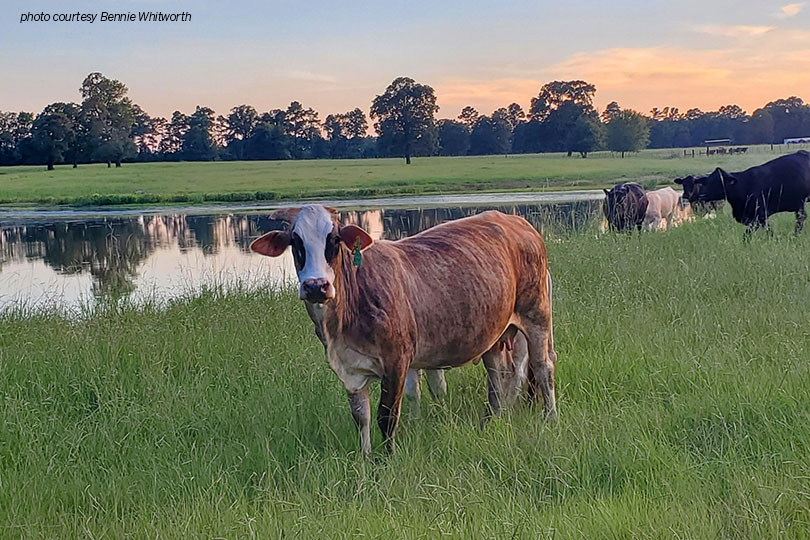By Jennifer Dorsett
Field Editor
East Texas rancher Bennie Whitworth strayed from the herd for several years, but his love for the land and cattle called him back home.
“I taught agricultural science for 18 years, but I kept building my ranching operation and came home to ranch fulltime six years ago,” Whitworth said. “I was always working to get back here. I grew up in Nacogdoches, and now I live one county over in Henderson, which is in Rusk County.”
Whitworth and his wife, Emily, run a 1,000-head commercial cow-calf operation, do custom hay baling, custom spraying and custom cattle care for other ranches.
In the fall, Whitworth usually buys stockers, but he didn’t purchase as many this year due to market interruptions.
“We’ve bought a few stockers, but we’re holding on to our calf crop and developing those since the market is so low,” he said. “We’re really hoping to see improved markets in the spring or the first of the year.”
The pandemic dealt the entire beef industry a heavy blow in the spring and early summer. Although processing plants are operating at near normal capacity, cattle prices remain depressed, an issue that’s concerning to Whitworth and other ranchers.
“Aside from market fluctuations and depressed markets, we saw a lot of issues back in the spring having difficulty with processing plants being backed up. Meat prices were high in the store, but producer prices were really depressed. That created some cash flow issues for us here at home,” Whitworth said. “I thought it kind of interesting that a lot of the people not in the industry would say, ‘Boy, I bet y’all are getting rich right now,’ and I’d have to try to explain how that wasn’t the case at all—exactly the opposite, actually.”
And the pandemic impacted Whitworth indirectly, too. Several of his custom cattle care customers were heavily tied to the oil and gas industry. When that market suffered, it took their cattle herds with it.
“On the custom care side of the operation, we had several customers that had to disperse their herds, which depleted our cattle inventory. That’s an aspect of our ranch that’s been included to help with cash flow,” Whitworth said. “We get paid a certain amount per head per month, so it created a lot of issues in juggling budgets, equipment payments, land notes and all the factors that come along with that.”
Although losing many of his customers was unexpected, Whitworth has picked up a new customer. That’s helped stabilize his situation.
But challenges still remain for the Rusk County Farm Bureau member.
During this time of year, he would normally sell about half of his calf crop. But with cattle prices still low, Whitworth only sold what he had to in order to pay some bills.
“We have loan payments and things of that nature structured around those times of year when we sell animals, but with the markets depressed, we only sold enough to make things work for now. We hope and pray for better times soon,” he said.
Many ranchers have tried selling their own beef by using smaller and local meat processors, but those smaller processors are overwhelmed.
“I talked to the slaughterhouse that does our personal stuff, and they’re booking for July 2021 right now,” he said. “There’s a lot of backlog there, and if that calf was ready for slaughter in April, you’re going to have three more months that you have feed and input costs, as well as the added risk that something will go wrong during that time like an accident or mortality.”
But it’s not all bad news.
Timely rains this summer proved beneficial to Whitworth’s hay crop, which will help with cash flow.
“We actually had a really good summer for hay, probably one of the best ones we’ve had in several years. We grew a lot of forage and produced a lot of hay, so that’s a positive aspect for the ranch,” Whitworth said. “We had an excess of hay to market and sell, which brings in a little extra revenue, and there’s still enough left over to feed our cattle.”
Although cattle prices have fallen, at least most of his input costs have stayed the same.
“One small benefit to the oil and gas crisis is that we’ve actually seen a decrease in fuel prices. I’d rather be selling beef at a higher price and paying a little more for fuel, but it’s okay for now,” he said. “Our inputs, as far as supplies and things of that nature, have been pretty consistent. We’re coming into fall and hitting our busier feed season. We book our feed early and luckily the prices hadn’t elevated when we booked ours. They’ve gone up a lot since then, so we lucked out in that regard.”
Even though he is frustrated with the issues in the meatpacking industry, Whitworth is thankful for the work Texas Farm Bureau and the American Farm Bureau Federation do to assist farmers and ranchers.
“I think Farm Bureau is wholeheartedly behind doing what’s best for farmers and ranchers. I think there is going to be an interesting debate around the consolidation of the meatpackers,” he said. “The agricultural community can rally together to help not only the producers, but each stage of the process. Profits need to be equally dispersed as much as possible up and down that supply chain, or there won’t be many American ranches to supply the beef.”
But Whitworth has no plans to throw in the towel. He’ll keep ranching as long as he can, and he hopes someday to pass the family business on to his son, Baxter.
“For a long, long time—basically since the beginning—farmers and ranchers have helped build this country. They made it the country that it is, and we’ll continue to push forward to try to make a living and provide the world with food,” he said. “But every year it seems like it gets a little tougher and a little harder. Groups like Texas Farm Bureau are essential to give us the voice we need to move forward.”
Agricultural advocacy is more important now than ever before, he said.
“Lots of us gripe at the coffee shop and are concerned about issues, but at the end of the day, it’s hard to leave the farm or ranch and go to the state or national capitol to advocate,” Whitworth said. “We’re thankful Farm Bureau is around to help with that and provide those opportunities for us to do those sorts of things, and I think Farm Bureau is going to even more important in the future for people like me.”


